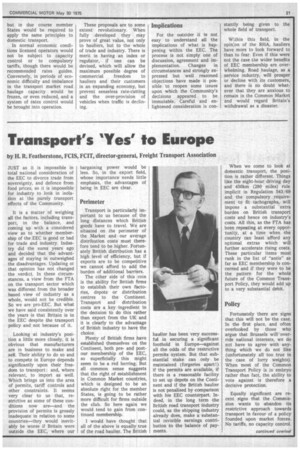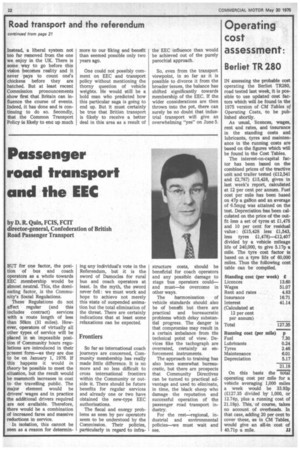Transport's 'Yes' to Europe
Page 31

Page 32

If you've noticed an error in this article please click here to report it so we can fix it.
by H. R. Featherstone, FCIS, FCIT, director-general, Freight Transport Association
JUST as it is impossible in total national consideration of the EEC to divorce trade from sovereignty, and defence from food prices, so it is impossible for industry to look in isolation at the purely transport effects of the Community.
It is a matter of weighing all the factors, including transport, in the balance, and coming up with a considered view as to whether membership of the EEC is good or bad for trade and industry. Industry did the sums years ago and decided that the advantages of staying in outweighed the disadvantages. Updating or that opinion has not changed the verdict. In these circumstances, a view from the FTA on the transport sector which was different from the broader based view of industry as a whole, would not be credible. So we are pro-EEC. But what we have said consistently over the years is that Britain is in the EEC despite the transport policy and not because of it.
Looking at industry's position a little more closely, it is obvious that manufacturers are in business to make and sell. Their ability to do so and to compete in Europe depends significantly upon their freedom to transport: and, where relevant, to import as well. Which brings us into the area of permits, tariff controls and other constraints. It seems very clear to us that, restrictive as some of these conditions now are—and the provision of permits is grossly inadequate in relation to some countries—they would inevitably be worse if Britain were outside the EEC, where our bargaining power would be less. So, in the export field, whose importance needs little emphasis, the advantages of being in EEC are clear.
Perimeter
Transport is particularly important to us because of the long distances which British goods have to travel. We are situated on the perimeter of the Market and our average distribution costs must therefore tend to be higher. Fortunately British distribution has a high level of efficiency, but if exports are to be competitive we cannot afford to add the burden of additional barriers.
The other side of this coin is the, ability for British firms to establish their own factories, depots or distribution centres to the Continent. Transport and distribution costs are a key ingredient in the decision to do -this rather than export from the UK and it is clearly to the advantage of British industry to have the choice.
Plenty of British firms have established themselves on the Continent, both preand postour membership of the EEC, so superficially this might seem to be a red herring. But all common sense suggests that the right of establishment in Common Market countries, which is designed to be an absolute right for the member States, is going to be rather more difficult for firms outside the club. So here again we would tend to gain from continued membership.
I would have thought that all of the above is equally true of the road haulier. The British
haulier has been very successful in securing a significant foothold in Europe—against all the odds of the restrictive permits system. But that substantial stake can only be maintained (forgeries apart!) if the permits are available, if there is a reasonable facility to set up depots on the Continent and if the British haulier is not penalised by comparison with his EEC counterpart. Indeed, in the long term the Britigh road transport industry could, as the shipping industry already does, make a substantial invisible earnings contribution to the balance of payments.
When we come to look at domestic transport, the position is rather different. Things like the eight-hour driving day and 450km (280 miles) rule implicit in Regulation 543/69 and the compulsory requirement to fit tachographs, will impose a substantial •extra burden on British transport costs and hence on industry's costs. All this, as the FTA has been repeating at every opportunity, at a time when the country can least afford any optional extras which will further accelerate rising costs. These particular items must rank in the list of "antis" as far as EEC membership is concerned and if they were to be the pattern for the whole future of the Common Transport Policy, they would add up to a very substantial debit.
Policy
Fortunately there are signs that this will not be the case. In the first place, and often overlooked by those who argue that Brussels will override national interests, we do not have to agree with anything which we do not like (unfortunately all too true in the case of lorry weights). When most of the Common Transport Policy is in embryo rather than fact, the ability to vote against is therefore a decisive protection.
Equally significant are recent signs that the Commission wants to abandon its restrictive approach towards transport in favour of a policy founded upon market forces. No tariffs, no capacity control.
Instead, a liberal system not too far removed from the one we enjoy in the UK. There is some way to go before this vision 'becomes reality and it never pays to count ones chickens before they are hatched. But at least recent Commission pronouncements show first that Britain can influence the course of events. Indeed, it has done and is continuing to do so. Secondly, that the Common Transport Policy is likely to end up much more to our liking and benefit than seemed possible only two years ago.
One could not possibly comment on EEC and transport policy without mentioning the thorny question of vehicle weights. He would still be a bold man who predicted how this particular saga is going to end up. But it must certainly be true that Britisn transport is likely to receive a better deal in this area as a result of the EEC influence than would be achieved out of the purely parochial approach.
So, even from the transport viewpoint, in so far as it is possible to divorce it from the broader issues, the balance has shifted significantly towards membership of the EEC. If the wider considerations •are then thrown into the pot, there can surely be no doubt that industrial transport will give an overwhelming "yes" on June 5.




























































































